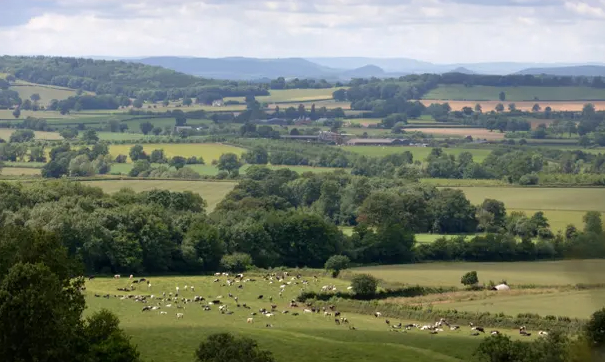November 25, 2025 | 16:59 GMT +7
November 25, 2025 | 16:59 GMT +7
Hotline: 0913.378.918
November 25, 2025 | 16:59 GMT +7
Hotline: 0913.378.918

Expected emission reductions for farming under the government’s new carbon budget from now to 2037 are 38% lower than previously promised. Photograph: Adrian Sherratt/Alamy
The UK government’s pledges on reducing greenhouse gas emissions from farming and land use fall short of promises made in its net zero strategy, analysis has found.
Using figures from the government’s carbon budget delivery plan, analysts from WWF found that the total projected emissions reductions from now until 2037 for agriculture and land use were 58% less than the emissions reductions figures underpinning the original net zero strategy. This gap is equivalent to the emissions of the entire UK building sector.
The government announced after Brexit that the EU’s common agricultural policy, where land managers were paid for the amount of land they were in charge of, would be replaced by environment land management schemes. Slowly being rolled out now, these are aimed at paying farmers to restore nature.
However, despite this, for farming the expected total emission reductions from now to 2037 in the new plan are 38% lower than previously promised in the government’s original net zero strategy, and continue to omit any actions to support a shift to more sustainable diets.
The total projected emission benefits from tree planting from now to 2037 are also 85% lower than previously claimed. Tree planting rates are currently only half of what is needed to be in line with net zero.
Peatlands are some of the most carbon-rich areas with the biggest benefits if they are restored. However, according to the WWF analysis, the total projected emission benefits from peatland restoration are 80% lower than the equivalent emissions from peatland promised in the original net zero strategy.
Environment campaigners have raised the alarm that this lack of ambition will not only impede efforts to reach net zero but will also have dire consequences for wildlife and biodiversity, which would benefit from better nature restoration policies.
Angela Francis, the director of policy solutions at WWF, said: “From our economy to the food and drink we consume; nature underpins everything that makes our lives possible. However, these figures show the government have knowingly settled for a lack of ambition, making it painfully clear the gap we face to tackle the climate and nature crisis is greater than ever.
“We need a proper decarbonisation plan for agriculture, proper investment to support farmers to transition to regenerative farming and meaningful action to support sustainable diets. We cannot halt the nature and climate crisis unless we transform the way we use our land. Investment to reward farmers is a vital step to provide what is necessary to meet our climate and environmental goals, reduce emissions and save our wild isles.”
Farmers have previously complained that they have been left behind and not helped to decarbonise their businesses, with the new payment schemes, which faced large delays in being implemented, difficult to sign up to and narrow in their scope.
Matt Williams, an independent climate and land expert who analysed the government’s figures for WWF, said: “The government is putting farming and nature even lower down the pecking order in its climate plan. This will make net zero harder to hit, leave farmers more exposed to climate impacts like drought, and undermine Britain’s food security.
“Farmers deserve to be financially rewarded for restoring trees, hedges, or peatlands, which can help underpin their bottom line and keep them in the business of growing food.”
The Department for Environment, Food and Rural Affairs has been contacted for comment.
(The Guardian)

(VAN) Brazil's COP30 presidency pushed through a compromise climate deal on Saturday that would boost finance for poor nations coping with global warming but that omitted any mention of the fossil fuels driving it.

(VAN) Poultry farmers in the UK have been warned that they could face one of the worst winters yet for bird flu.

(VAN) Prices of main-crop paddy have risen sharply, with jasmine rice hitting 16,100 baht per tonne — the highest level in years.

(VAN) In Brazil, FAO unveiled a series of reports and initiatives showing how sustainable agrifood systems are a solution to the climate crisis.

(VAN) With names like neodymium and dysprosium, rare-earth elements sound exotic — and their perceived scarcity has only added to the mystique.

(VAN) In a new study published in Trends in Biotechnology, researchers used a gene-editing technology called CRISPR to increase a fungus's production efficiency and cut its production-related environmental impact by as much as 61%- all without adding any foreign DNA.

(VAN) A top official in Beijing’s Cop delegation says China is committed to clean energy – but US’s absence is a problem.